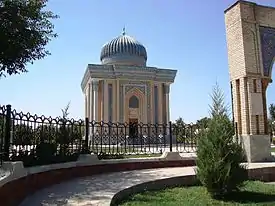Abd al-Hayy al-Lucknawi
Abdul Hayy Lucknawi Firangi Mahali (1264 - 1304 A.H./1848 - 1886 C.E) was an Indian Islamic scholar of Hanafi school of Islamic thought.
Maulana Abd al-Hayy al-Lakhnawi | |
|---|---|
| Title | Imam |
| Personal | |
| Born | 24 October 1848 (26 Dhul Qa'dah, 1264)[1] |
| Died | 27 December 1886 (aged 38) (29/30 Rabi al-Awwal 1304)[2] |
| Resting place | Anwar Bagh, Lucknow[3] |
| Religion | Islam |
| Denomination | Sunni |
| Jurisprudence | Hanafi |
Lineage
Abdul Hayy was born in Banda, India, in 1847. He was a descendant of Abu Ayyub al-Ansari.[4]
Early life
After his father's death, he studied some books in mathematics under his father's tutor, Muhammad Niamatullah. He taught for a while in Hyderabad. Subsequently, he left for Lucknow where he remained for the rest of his life.[4]
Scholarly accomplishments
He reportedly saw numerous companions of Muhammad in dreams, including Abu Bakr, Umar, ibn Abbas, Fatimah, Aishah, and Umm Habiba. In his dreams he also claimed to have met Malik ibn Anas, al-Sakhawi, Jalaluddin Suyuti and other scholars, from whom he benefited as mentioned in a separate book on this topic.[4]
Status as a Muhaddith
The Mufti of Makkah, Ahmad Ibn Zain Dahlan, granted him permission for all isnad (chains of narration) from Al Hidayah of Burhan al-Din al-Marghinani Muhammad Ibn Abdullah Hanbali of Makkah, Muhammad Ibn Muhammad Al-Gharbi, and Abdul Ghani Dehlwi also granted him permission for various isnad.[4]
Literary works
- Gheebat Kya Hai?[5]
- Al-Ajwibah al-Fadilah lil As'ilat (Arabic)[6]
- Al-Raf' Wal Takmil Fil Jarh Wal Ta'dil (Arabic)[6]
- Iqamatul Hujjah 'Ala Annal Ikthar fil ta'abud (Arabic)[6]
- at-Ta'liq al-Mumajjad (Arabic)[6]
- Sharh Al-Wiqaya Ma'a Hashiyat 'Umdatul Ri'ayah (Arabic)[6]
- Tuhfatu Al-Akhyar bi Ahya Sunnat Sayyid al-Abrar (Arabic)[6]
- Sibahatil Fikr Fil Jahr Bil Zikr (Arabic)[6]
- Rijal : Narrators of The Muwatta al-Imam Muhammad[6]
- Dhikr In the Vocal Form, Permissibility and Virtues of Dhikr[6]
Death
He died in Rabi ul Awwal 1304 A.H. (1886 C.E.) at the age of 38-39 and was buried in the graveyard of his ancestors.[4][2]
References
- Dr Waliuddin Nadwi. Allama Abd al-Hayy Lakhnawi: Hayat-o-Khidmat (in Urdu). Translated by Muhammad Rafey Azmi Nadwi. Markaz ash-Shaykh Abul Hasan Ali Nadwi, Muzaffarpur, Azamgarh. p. 87.
- Dr Waliuddin Nadwi. Allama Abd al-Hayy Lakhnawi: Hayat-o-Khidmat (in Urdu). Translated by Muhammad Rafey Azmi Nadwi. Markaz ash-Shaykh Abul Hasan Ali Nadwi, Muzaffarpur, Azamgarh. pp. 96–97.
- Dr Waliuddin Nadwi. Allama Abd al-Hayy Lakhnawi: Hayat-o-Khidmat (in Urdu). Translated by Muhammad Rafey Azmi Nadwi. Markaz ash-Shaykh Abul Hasan Ali Nadwi, Muzaffarpur, Azamgarh. p. 97.
- "Maulana Abdul Hayy Lucknawi [1264 – 1304 A.H.]". HaqIslam.org. Retrieved 22 April 2019.
- Maulana Abdul Hayy Lakhnawi. Gheebat Kya Hai? (in Urdu). Maktaba Aarifeen, Ruqayya Buildiing, Pakistan Chowk, Karachi. Archived from the original on 12 November 2011. Retrieved 22 April 2019.
- "Imam 'Abdul Hayy Lucknawi [1264 - 1304 A.H.]". kitaabun.com. Retrieved 22 April 2019.
